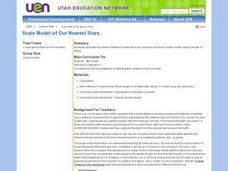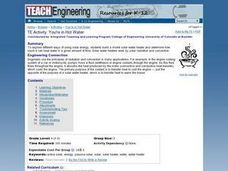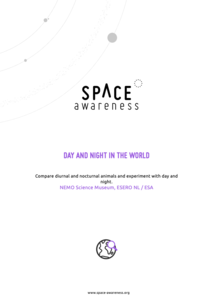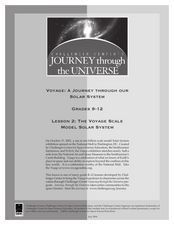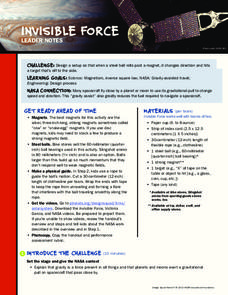Curated OER
Scale Model of Our Nearest Stars
Sixth graders calculate a light day, light hour, and light minute from the standard of a light year. After establishing the distances, a one meter scale is created to demonstrate the distance between the sun and the planets of our solar...
University of Connecticut
Building Your Own Biosphere
On September 26, 1991, four women and four men entered the scientific experiment, Biosphere 2; the doors were sealed for two years in order to study the interactions of a biosphere. In the activity, scholars explore biospheres by...
Curated OER
Make a Comet Model and Eat It!
Students construct a comet model based on procedure provided. In this space science lesson, students compare the physical properties of comets to the models they made. They record their observations and share them with the class.
Curated OER
Our Amazing, Powerful Sun
Students examine where energy comes from and how it can be used. In this solar energy lesson students explore different aspects of the sun.
Space Awareness
Seasons Around the World
Why does Earth experience summer, fall, winter, and spring? Using an informative demonstration, learners see how the angle of the sun on Earth and the rotation of Earth determine the seasons. Scholars work in pairs to learn that the...
Teach Engineering
Photosynthesis—Life's Primary Energy Source
Wouldn't it be great if you could produce your own food? Scholars learn about the processes of photosynthesis and cellular respiration in plants. They consider how to use photosynthesis as a model of an efficient system and how to apply...
Curated OER
A View Of Home From The Front Door and From Space
Students discover how distance can change how our view of an object. Students build a representative model of where their home is located from different distances. They create three drawn models of their home from various elevations as...
Curated OER
Scale Models to Planet Size
Students consider the comparative sizes of the planets in the solar system. In this scale lesson, students select balls of different sizes to represent the planets in the solar system.
Curated OER
TE Activity: You're in Hot Water
Young scholars study different ways of using solar energy. They design a solar water heater and determine how much water it can heat in a set amount of time. They examine how the heaters work by solar radiation and convection.
Curated OER
Exploring Meteorite Mysteries: Building Blocks of Planets
Students simulate the formation of chondrites and asteroids. In this astronomy lesson, students demonstrate accretion using balloons and static electricity. They compare and contrast their models to the actual process of chondrites and...
Curated OER
Blast Off with Model Rockets
Learners investigate science and math by building a rocket. In this geometry instructional activity, students build a rocket using paper towel tubes while investigating questions about launching a rocket. They discuss balance and unique...
Curated OER
Pioneers of Space
Students explore how to use natural resources in the next millenium. Students create a KWL chart and then research information on our solar systsem, natural resources, and environments. Students build a model of a future community and...
Space Awareness
Making A Sundial
Can people really measure time just by using the sun? Scholars venture outside on a nice, sunny day to build sundials and learn how people measured time 600 years ago. The class builds two different sundials while gaining practice with...
Space Awareness
Day and Night in the World
How do different parts of the world experience day and night? Introduce scholars to the concept of global citizenship while teaching about animal behavior with discussion of nocturnal and diurnal animals. Then, learners complete...
Curated OER
The Voyage Scale
Young scholars identify how models are powerful tools of exploration and that the sizes of the planets and distances between the planets in the Solar System span a large range. They make a sign for each planet they have created in the...
Space Awareness
History of the Universe
Your pupils may believe that you and their parents are the oldest things in the universe, but surprise! There are elements of the universe that are even older. Elementary scientists create a class timeline to demonstrate the expansive...
Curated OER
The Building Blocks
This PowerPoint is a comprehensive review of all the facts related to an atom's basic structure and function. What makes this unique is that it is geared toward an audience of junior geologists. After introducing the periodic table of...
Curated OER
Cosmic Wheels
Students build a scale model of the Solar System and determine the time other planets take to travel around the Sun in comparison to the time of the Earth's revolution. The velocity of the planets are also determined in this...
Curated OER
Walk a Mile in your Orbit
Middle schoolers create an awareness of the distance between the planets and the complexity of the solar system through a model of an active solar system. they incorporate physical education and math with the ability to convert distances...
Curated OER
Deep Impact's Comet on a Stick!
Students create a model of a comet. In this space science lesson plan, students compare their model to the characteristics of a real comet. They evaluate and make necessary modifications to their original design.
Curated OER
Distance in Space
Sixth graders explore space science by measuring distances between planets. In this solar system lesson, 6th graders view a Bill Nye video and discover the conversion between the metric system and imperial measuring systems. Students...
DiscoverE
Touch Down
Protect the marshmallows! Groups create contraptions that will keep marshmallows in a cup, even after dropping them from a certain height. This is a fun way to model the shock-absorbing capabilities of spacecraft.
Starry Night Education
Comets and Meteors
Comets are also known as dirty snowballs or icy mud balls. With your super scientists, create a model comet nucleus to discover how they are made and take part in a scientific discussion to learn how it behaves.
PBS
Invisible Force
Investigate invisible forces. Young engineers design a setup that changes the direction of a steel ball using a magnetic force. The purpose of the setup is to model the gravitational pull of spacecraft by planetary bodies.


